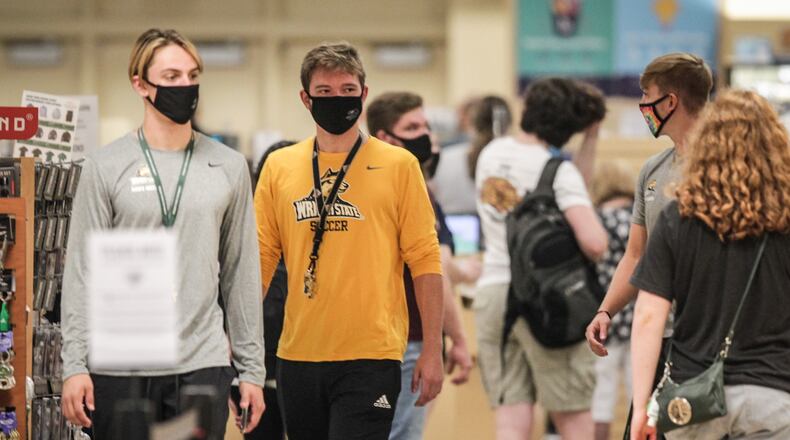The university anticipated positive coronavirus cases on its campuses, so the school leaders included the clinic in its contingency plan for the fall semester, he said. They hope to test as many students as possible to contain the virus.
“We are following what we expected to happen,” he said. “Having said that, I’m very pleased that things have gone as well as they have.”
Once the clinic opens, the testing process will cover a range of possibilities. Officials will continue to encourage anyone affiliated with the university to get tested as needed.
Students who show symptoms and those who have been in contact with individuals who have tested positive will be ordered to get tested, Leaman said. There will also be surveillance testing, meaning individuals will be randomly selected to help the institution monitor how or if the virus continues to spread among students and faculty, he said.
When its clinic opens in the next couple of days, WSU will be the second institution in the region conducting surveillance testing. The University of Dayton has been testing students regularly since fall classes started more than a week ago. As of Wednesday afternoon, the school has a total of 801 active cases, including 70 new ones from Tuesday.
Central State University, which said it will test all of its students who live on campus and employees, also plans to conduct random testing throughout the semester when classes start on Sept. 14. They so far have not had any positive cases on campus, school officials said.
Cedarville University recently reported one new case, bringing its total to two. Wittenberg University in Springfield on Wednesday reported three active cases, with 14 awaiting test results, officials said.
Antioch College in Yellow Springs tested new and returning students, and all were negative, spokesman James Lippincott said.
Miami University reported 132 new student cases Wednesday, bringing its total to 704 since Aug. 21.
WSU did not report any new cases on Wednesday, but Tuesday officials announced that four students and one employee tested positive for the virus on its Dayton campus. Each person self-reported, Leaman said. All the students are enrolled in online classes, the university said.
School officials have encouraged students and employees to self-report if they test positive for the virus. But even if they don’t, medical facilities that administer COVID-19 tests will alert the institution if anyone affiliated with it were to test positive or if they’ve been in contact with anyone on campus, he said.
“Although the self reporting is working very well, we do have additional mechanisms for receiving information,” he said.
The university previously has not made testing available on campus because it has a hybrid model in place in which 70% of classes are held online and 30% in person. In addition, a large number of students are commuters, the school said. That model has worked well for the university so far, and its plan will help them manage five cases as well as any future ones, Leaman said.
“We continue to feel confident that we have set up our fall semester in such a way to really be out in front of this,” he said. “It’s been a positive experience so far, even though we we do miss our students. But I think with our priority on safety right now, we’re just going to be diligent as to how we move forward.”
About the Author

